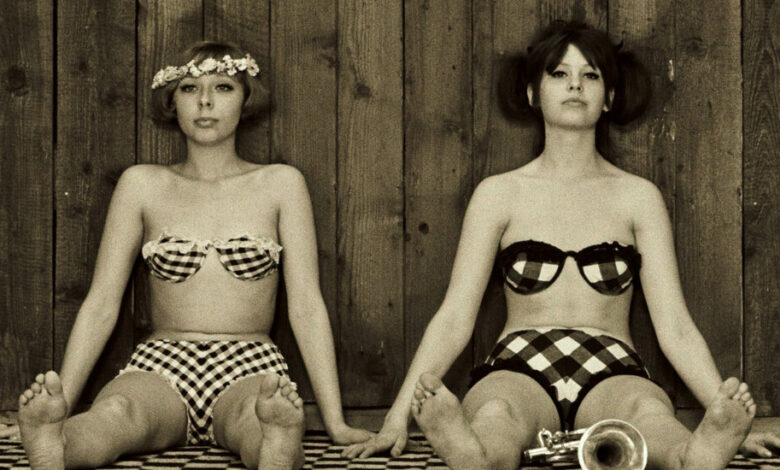‘Daisies’: Two Wild and Crazy Gals

The emergence of a cinematic new wave in Communist Czechoslovakia was among the major film stories of the late ’60s. Some examples, like Jiri Menzel’s Oscar-winning “Closely Watched Trains,” were rueful humanist comedies. Others, such as Jan Nemec’s instantly banned “Report on the Party and the Guests” were anti-totalitarian allegories.
And then there was “Daisies,” directed by Vera Chytilova from Ester Krumbachova’s script. Newly restored, it opens Friday for a run at the IFC Center in Manhattan.
First shown in New York in June 1967 at the Museum of Modern Art, “Daisies” was dismissively reviewed by the New York Times critic Bosley Crowther. As though channeling a baffled Czech apparatchik, Crowther pronounced the movie “a pretentiously kookie and laboriously overblown mod farce about two playgirls who are thoroughly emptyheaded.” Play girls perhaps, empty-headed perhaps not.
“Daisies,” the creation of two mature female artists, might alternately be described as an anarchic conspiracy featuring an insolent pair of wild and crazy gals, determined to be as “spoiled” as the world.
With their singsong voices, obnoxious Woody Woodpecker chortles and clownish herky-jerky movements, Marie I (Jitka Cerhova) and Marie II (Ivana Karbanova), suggest two marionettes run amok, which is how they identify themselves. That they are played by nonprofessionals (one a student, the other a sales girl) and appear to be egging each other on gives the movie a behavioral, if not documentary, subtext.
At once nubile and infantile, the Maries are creatures of impulse and appetite — mainly for food and destruction. Making a picnic on her bed, one attacks a repast of sausages, baguettes and bananas, wielding scissors like Harpo Marx in “Duck Soup,” then sets alight some decorative streamers with pyromaniacal glee. The spectacle they make of themselves disrupting the corny floor show and harassing the uptight patrons at a Prague nightclub with their desultory, drunken antics, is as funny as anything in “A Night at the Opera.” Funnier, actually.
“Daisies” flouts cinematic convention throughout. The insouciant visual razzmatazz might suggest an extreme version of a Richard Lester mod comedy, but the movie is spiritually closer to contemporary transgressive films and happenings by artists like Carolee Schneemann, Yayoi Kusama and Barbara Rubin — work with which the cosmopolitan Chytilova was largely familiar.
Still, as the subsidized product of a supposedly rational socialist order, “Daisies” is more inherently political than something like Schneeman’s orgiastic “Meat Joy.” Chytilova’s movie is a nihilist provocation from start to finish. Among other amusements, the Maries accept dinner invitations from middle-aged men of the precise sort who might censor the film. Like “Daisies” itself, they typically embarrass these stodgy authority figures with their shameless gold-digging and terrible table manners.
Indeed, despite numerous affronts to the patriarchal order, it is the climactic food fight that seems to have most offended Czech government officials. According to the film historian Peter Hames, the National Assembly condemned Chytilova for wasting food at a time when farmers were struggling with agricultural production.
“Daisies” was shelved, briefly released and then, after the 1968 Soviet invasion of Czechoslovakia, banned again. So, too, the director. Although eventually able to resume her career, Chytilova never made another film quite like “Daisies.” Neither has anyone else.
Daisies
Opens Friday at the IFC Center in Manhattan; ifccenter.com.
